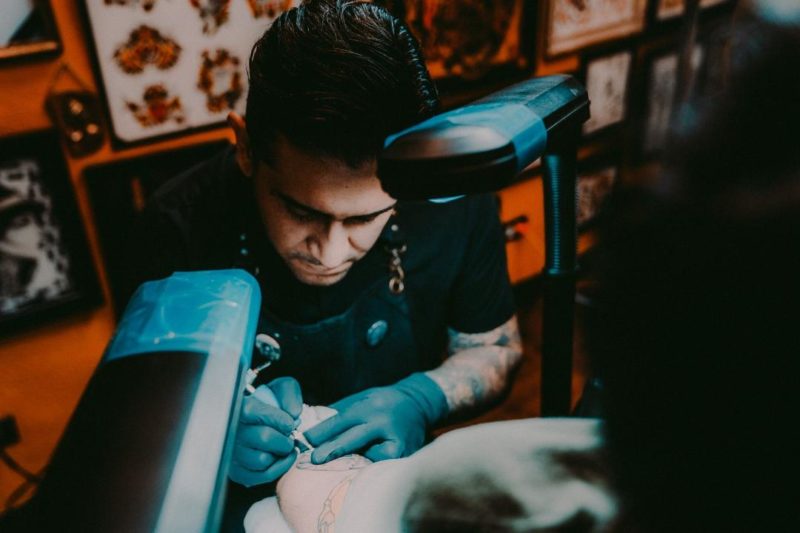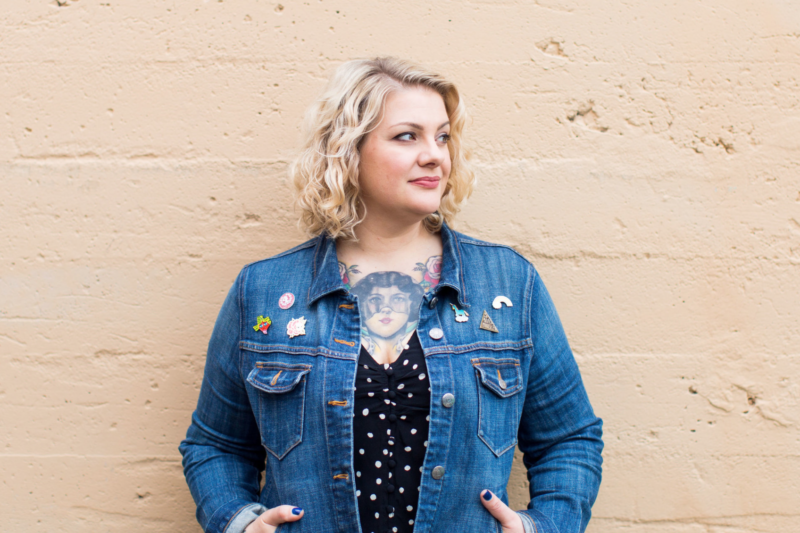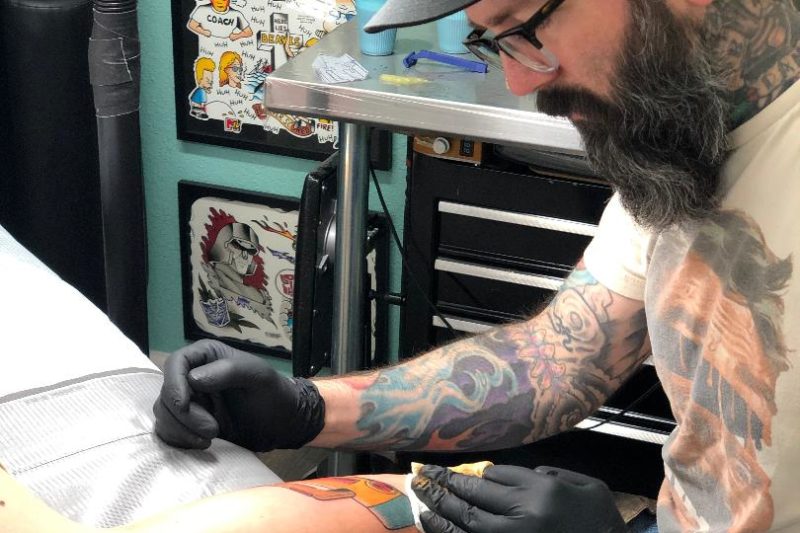Austin Tattoo Artists Grapple with the Impacts of COVID-19
By Hope Lenamon
Reporting Texas

Tattoo artist AJ Maloney owns Black Dagger Tattoo in Austin. The shop closed down on March 23 due to the COVID-19 Pandemic. Credit Matt Bender.
This story has been updated.
Tattoo shops across Austin are silent. No buzzing of needles. No friendly banter between tattoo artists. No new designs being drawn up with clients.
Usually full of the people, life and art that have come to define Austin, tattoo shops in the city shut their doors in late March as part of efforts to combat COVID-19.
As of Friday, May 1, Gov. Greg Abbott’s plan to reopen the state will allow some Texas businesses, like restaurants, retailers and movie theaters, to resume operations under new restrictions. Abbott said he expects a second wave of openings on May 18, including barbershops, bars and gyms. Because it’s unclear when tattoo shops will be back in action, however, tattoo artists struggle to find other ways to make a living.
“We don’t provide an essential thing,” AJ Maloney, a 20-year tattoo artist and owner of Black Dagger Tattoo, said. “ You’re not going to buy a tattoo before you buy milk and eggs.”
Maloney, 37, said he first started monitoring the severity of COVID-19 when tattoo artist friends overseas gave him a heads-up. Maloney said changes to how Black Dagger ran began on March 13 when the shop required customers waiting to get a Friday the 13th tattoo to leave a phone number and come back when it was their turn.
The next week, Maloney said the North Austin shop, which was opened in 2013, shifted to appointments-only and eventually closed down one day before the mandatory shelter-in-place order for Travis County on March 24. For Maloney, it’s been the longest time in his career he’s gone without doing a tattoo.
“We were trying to take precautions before we were getting any kind of rules put in place, but you know, even though it was gradual it seemed really quick,” Maloney said. “One day to the next we were just done.”
While Black Dagger is closed, Maloney still has bills to pay. With artists not working, gone is the percentage of sales from their appointments that would typically help cover the shop’s overhead. Maloney said he is grateful his landlord has allowed him to pay a portion of his rent now and make up the rest at a later date.
“With no income coming in from any of the tattooers or myself, it’s scary still having to pay those bills,” Maloney said.
Meanwhile, the shop is selling T-shirts, but sales don’t generate enough money to make ends meet. Maloney is comfortable with his personal financial situation, but he worries about his coworkers, he said.
“The guys in the shop call me dad, and I look at the guys like my kids,” Maloney said.
To supplement his income, Maloney held a raffle in which people bought a ticket for a chance to win a tattoo session with him. He also started selling artwork online. Other tattoo artists in his shop are selling paintings, prints and taking commissions for artwork, although it can be hard to find inspiration right now, Maloney said.
Tattoo artist Stacey Martin has worked at Red Stag Tattoo in South Austin since 2018. Martin, 41, said that prior to the March 24 shelter-in-place order, the owners of Red Stag Tattoo told the artists they wouldn’t have to pay rent for their space because they didn’t want anyone to feel they had to keep working if they worried about contracting COVID-19.

Tattoo artist Stacey Martin has worked at Red Stag Tattoo in South Austin since 2018. Credit Sarah Deragon
“When I got the text that said that I just immediately started crying,” Martin, who is going on 16 years of tattooing, said. “It was just like, ‘Wow, this is really happening.’”
Unlike some tattoo artists who had to make a quick pivot to alternative revenue streams when their shops closed, Martin said she is fortunate she already was selling her artwork online. Martin started selling merchandise with her designs through crafts fairs and shows when she moved to Austin in 2008, through Etsy in 2010 and on Society6 in 2017.
“I think any other form of revenue in this time is super important for people that aren’t even tattooers,” Martin said. “It’s not something that’s going to be realistic across the board for everyone that’s currently lost their jobs, but it does help a little bit.”
Martin also is promoting other tattoo artists, even those not in her shop, via social media. It seems others are promoting her as well. During the last few weeks, her social media analytics have risen dramatically, she said.
She also supports colleagues by taking advantage of their non-tattoo services. Fellow tattoo artist Michael Williams, for example, has a side business printing artwork. Martin used his services before the pandemic began and continues to do so now.
Williams, 40, works at Resurrection Tattoo in East Austin and has been tattooing professionally for 16 years. He decided to invest in a commercial-grade printer to produce prints for himself and others who need small-batch printing larger shops don’t offer. While producing prints brings in some money, however, he said it can’t sustain his wife and himself in the long-term.
“I wish I could say that everything was going to be fine with me just doing prints,” Williams said. “It definitely has been very helpful. Like, in this situation it’s definitely going to afford me the luxury of being able to buy some groceries.”
Williams stopped tattooing on March 14, and immediately questioned the decision. Although Resurrection Tattoo shut down before nonessential businesses were closed, a lack of reliable information made it hard to know what to do, he said. Once he realized how important staying home and social distancing was even for people with no symptoms, he said he felt confident in momentarily stepping away from tattooing.
Although Williams feels he made the right choice, he said he may not receive unemployment benefits. Since most tattoo artists are considered independent contractors, they typically don’t qualify. The Cares Act, which was signed into law on March 27, includes benefits for independent contractors. But Williams said he hasn’t been able to get any guidance on filing for the benefits despite reaching out to the Texas Workforce Commission online and over the phone.
In a deal worked out with his bank, Williams is paying half the ordinary monthly installments on his home mortgage; he is also paying half his standard rent for space at Resurrection. Even so, he said he may have to find another job depending on how long tattoo shops stay closed—and he doesn’t know what else he would be qualified to do.
“I felt like I had a career, and now I’m realizing that, as much as I love my job, it’s not as secure as I hoped,” Williams said.
Maloney, Martin and Williams all stressed the key to getting through this unforeseen time in the tattoo world, and for all of humankind, is to stick together as a community, even if it’s solely online for the time being.
“Hopefully years from now we’ll be able to be like, ‘Remember back in 2020 when we couldn’t tattoo for a couple months,’” Williams said. “Hopefully after this, people do appreciate tattooing more.”
